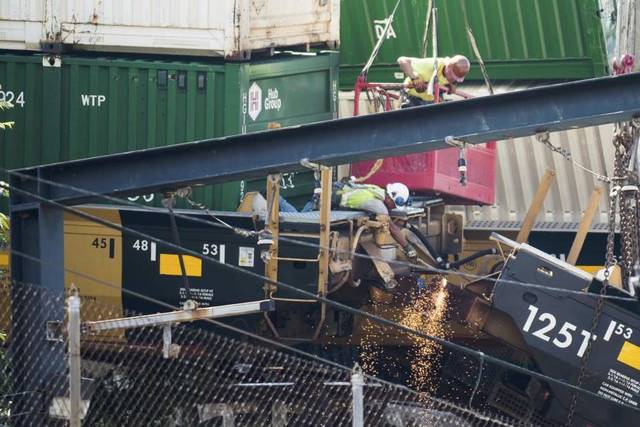https://triblive.com/opinion/editorial-does-norfolk-southern-proposal-double-rail-cars-and-risk/
Editorial: Does Norfolk Southern proposal double rail cars and risk?

When you have a lot of rivers, you’re going to have a lot of bridges. When you are a city that was built on coal and steel, you’re going to have a lot of trains.
And sometimes that’s double the trouble.
Norfolk Southern wants to rebuild a bridge on a North Side city street. The Brighton Road bridge needs repairs, the railroad company said. That bridge is dangerous, they told the Pennsylvania Public Utility Commission.
Oh, and they added something else. They’d like it to accommodate bigger loads. Specifically, they want it to handle double-decker train cars. The bridge as it stands doesn’t have the clearance for the proposed loads.
From a financial standpoint, it makes sense. Doubling the number of cars on a train obviously doubles the amount of freight that can be hauled, increasing the overall amount of money the company can make for a single trip. Railroads have even argued that the practice reduces the environmental impact of hauling since they are moving more product for much the same fuel.
But that isn’t the only cost.
There is the toll on the area where the trains come through. How is stacking the containers and running them through a city going to affect the area? Will it be noisier? Will it decrease visibility? Will there be more collisions? How will property values be affected?
In August, a double-decker train derailed near Station Square. The report Norfolk Southern sent to the Federal Railroad Administration blamed a broken rail and estimated $853,000 in equipment and track damage. But just this month, the Port Authority of Allegheny County sent the company a bill for $3 million for the costs the incident precipitated while the T stop and the Monongahela Incline were closed for 20 days.
Pittsburgh has opposed the proposal, calling it a public safety hazard that will have an adverse impact.
“We’re talking about the possibility of a catastrophe that would impact tens of thousands of people should something go wrong on a track that is not a straight line track,” Mayor Bill Peduto said.
Norfolk Southern has said it has a “rigorous track inspection program” to comply with federal rules. But is that enough to increase the use of the doubled cars in an area that was never built to accommodate transport that large?
When you are talking about a potential catastrophe, you want to hear what a company is doing to go above and beyond what is required, not just what they have to do to comply. After all, if they can double the capacity of the train, they should be able to double the effort to make it safe.
Copyright ©2026— Trib Total Media, LLC (TribLIVE.com)
